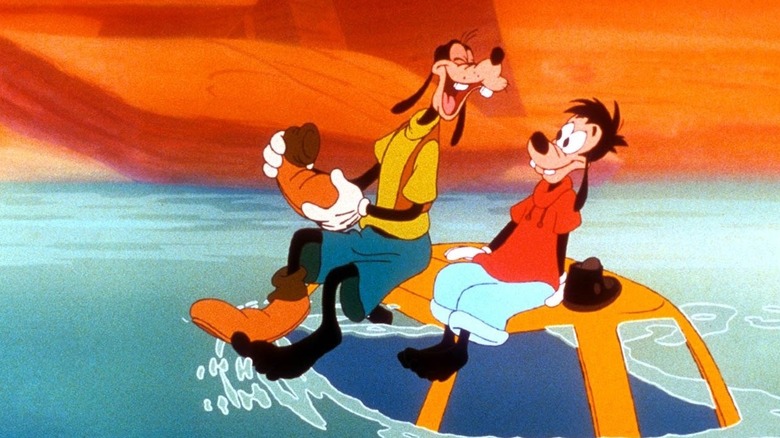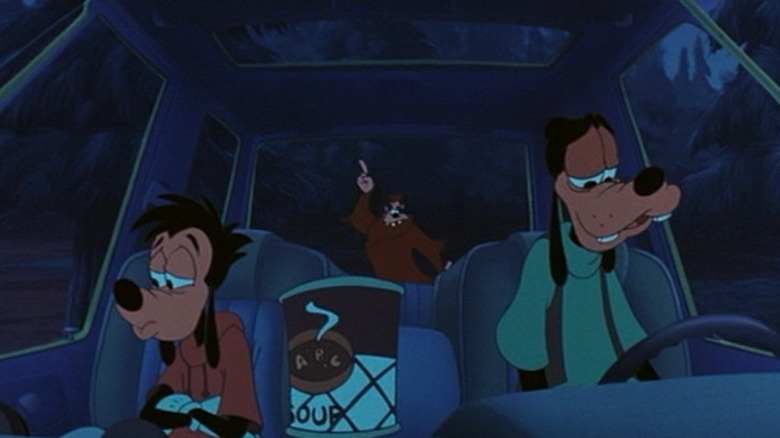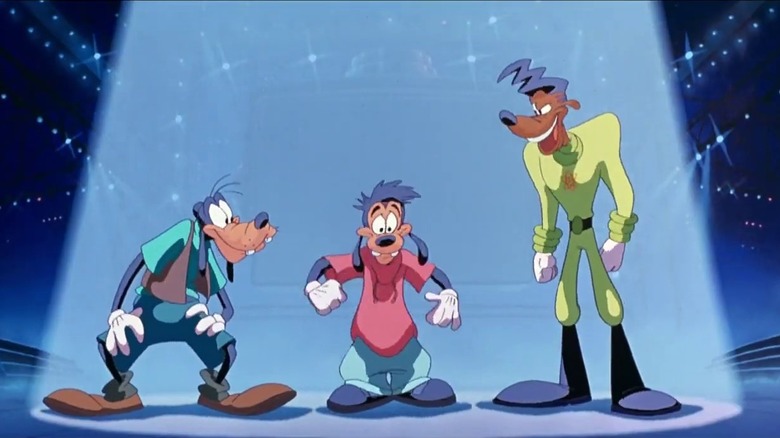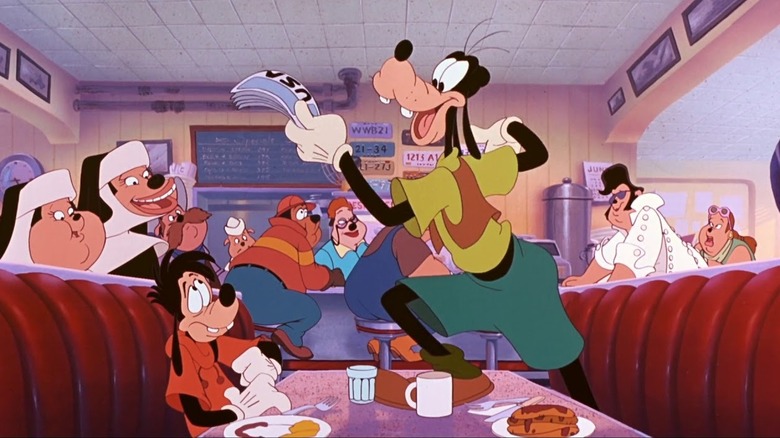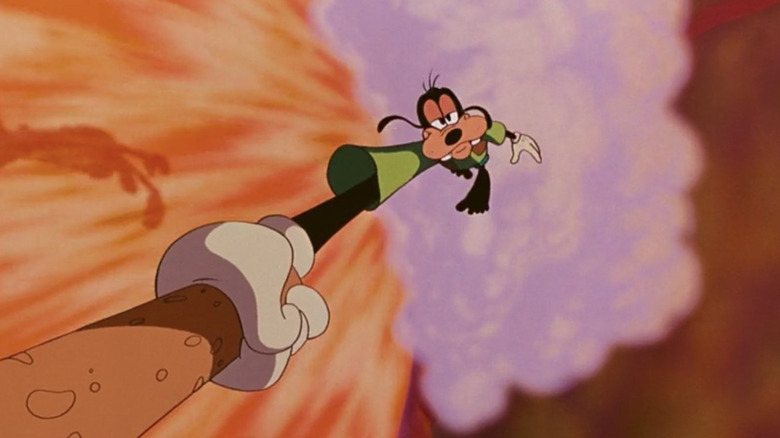A Goofy Movie's Success Defied All Of Disney's Expectations
It's one of the tragic moments of adulthood. You sit down to watch a film you idolized in your childhood — and haven't seen in just as long — only to discover a far less magical or even entertaining experience. Luckily, that's absolutely not the case with the 1995 Disney classic "A Goofy Movie," which I recently treated myself to a rewatch of. I am happy to report that the movie is still as heartwarming and hilarious as I remember it. From the big laughs of the Bigfoot scene to the teary eyes I still get when Max and Goofy finally reconcile.
But from the very beginning, Disney had less than stellar expectations for "A Goofy Movie" compared to bigger features like "The Lion King" or "Pocahontas." In fact, it wasn't even developed by Walt Disney Animation Studios (then called Walt Disney Feature Animation) but rather by a subdivision called Disneytoon Studios that had only two films under its belt so far: "DuckTales the Movie: Treasure of the Lost Lamp" and "The Return of Jafar."
Yet despite the dismal critical response and fraction of money it earned at the box office, there still exists a ton of fervor over "A Goofy Movie" that's only grown in the last decade. After all, people don't spend time rewatching a film they saw in their childhood, sharing it with their friends, partner, or kids because of how well-reviewed it was or how much money it made.
Disney's low expectations for A Goofy Movie was a self-fulfilling prophecy at first
Part of the reason Disneytoon Studios created "A Goofy Movie" was that it was originally supposed to be a direct-to-video release. In fact, they've developed pretty much every one of Disney's many direct-to-video sequels and spinoffs since then. From "The Lion King II: Simba's Pride" and "Pocahontas II: Journey to a New World" to the Goofy sequel "An Extremely Goofy Movie." So maybe "A Goofy Movie" wasn't exactly being set up to fail so much as just not worth spending that much money on. This is pretty blatantly illustrated in the film's $18 million budget compared to the $45 million given to "The Lion King."
Producer Don Hahn went so far as to tell Vanity Fair: "It wasn't even a B movie. It was a C movie." And even when the film was allowed to have a theatrical release it was severely limited — with no premiere in California (ironic for a film with where the destination is Los Angeles) and instead debuted only at the AMC Pleasure Island theatre in Walt Disney World in Orlando, Florida. Hahn even said the release of the film only happened as part of "fulfilling a corporate legacy" laid down by Jeffrey Katzenberg, the former Disney chairman that originally greenlit the project. So there basically couldn't have been more apathy or indifference at Disney towards "A Goofy Movie."
Given the studio's feelings towards the film and the restrictions on its theatrical release, it's probably no surprise it didn't exactly draw people into theaters. Its total earnings of $37.6 million are only a fraction of the $191.8 million "The Lion King" drew in its first weekend. But this was the '90s, an era in which films that slumped in theaters could find a second wind (and a cult following) thanks to VHS.
The comeback of non-traditional Disney classic
The following that "A Goofy Movie" earned in the years after its theatrical release reached a fever pitch in 2015 at the D23 Expo in Anaheim, California for its 20th anniversary. A reunion roundtable, hosted by Hahn, was held that included many of the film's voice actors, screenwriter Jymn Magon, and director Kevin Lima. "They had a list on some Disney websites about 10 must-see panels at the D23 convention. We weren't even listed in the top 10," Goofy voice actor Billy Farmer told Vanity Fair. "But we were number one in attendance and audience satisfaction."
The actor said they actually needed to turn away people at one point because they'd already exceeded the 500-person capacity of the auditorium they were in. "We had an almost three-minute standing ovation at the end," Farmer said. "It was incredible. I felt like one of the Beatles." Or — maybe Powerline? After all, the music of "A Goofy Movie" is undoubtedly one of the reasons it's remained ingrained in the minds of its fans. "Stand Out" and "I 2 I," sung by Powerline voice actor Tevin Campbell are timeless jams, while its opening song "After Today" went viral in a 2009 YouTube video.
But catchy musical numbers are really all "A Goofy Movie" had in terms of what Hahn would call the "hallmarks" of a Disney classic. "There's no princess; there's no castle; there's some raccoons and a banjo," he said at the D23 Expo. "But it has every hallmark in terms of its emotion, and relationships, and humanity, and storytelling, and connection that you expect from a Disney classic. And that's what makes it enduring."
A relatable tale about a parent and child connecting
The father-son duo of Goofy and Max first appeared in the television series "Goof Troop," though it featured a much younger Max. For his first film, the character was aged to be a high school teenager plagued by the second-hand embarrassment of having the characteristically goofy Goofy as a dad. Magon told Vanity Fair that the change had a lot to do with Katzenberg who, "like a lot of parents," was having a hard time connecting with his teenage daughter: "He said, 'I couldn't figure out how to get through to her. But we ended up taking a car trip together ... Somewhere along the way, we bonded. I want a story like that.' I said, 'Okay.'" They were off."
In the film, the road trip aggravates the various conflicts between father and son. But it also creates an opportunity for Goofy and Max to reflect on what they want and need from each other — without the distractions of other people's opinions on the matter. Of course, all of that culminates in the film's climax when Max saves Goofy from falling down a waterfall by using his dad's "Perfect cast" technique to catch him. The wordless reconciliation between the two as Max reels his dad up (physics be damned!) has always been such an emotional gut-punch to me. And apparently, it was for Farmer's son as well.
It also made Goofy voice actor Billy Farmer's son cry
When Billy Farmer took his five-year-old to see an early screening, he noticed some tears. "I said, 'What's the matter, buddy? Didn't you like the movie?'" he told Vanity Fair. "And he said, 'When Goofy was going over the waterfall, I thought that was you.'" Something about that scene has always stuck with me too — its stark red colors, the mist from the waterfall like hot steam, and Max's personal terror — that still elicits some anxiety when watching it. But some of the best Disney movies can both scar at fundamental levels (i.e. every parental death from "Bambi" to "The Lion King) and deliver some seriously heartwarming moments.
Which is another reason Farmer believes "A Goofy Movie" endures. "I've probably done close to 4,000 projects for Disney, but 'A Goofy Movie' was unlike any other project that I've worked on over the last 33 years," he told Entertainment Weekly. How does he measure the distinction? By the sheer number of fans that come see him at conventions like Comic-Con or Disney Expos or write to him to express their gratitude for what the film meant to them personally.
"I hear people say, 'Yeah, I couldn't talk to my dad very well, we weren't that close, but 'A Goofy Movie' kind of brought us together and we would play it every year, or put on the soundtrack in the car.' That one movie has kind of identified with people more than anything else I've ever done."
Like the film's road trip, "A Goofy Movie" has become a way for parents and their children to either connect or reconnect. Over time, that ability to move people has only gotten stronger, with every decade and generation lending it new nostalgia.
